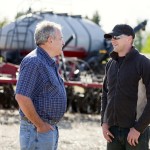A San Francisco company providing farm management software to growers in four provinces and about three dozen states is poised to join the digital arm of DuPont and Dow’s merged agribusiness. DuPont — which as of last week had all regulatory approvals and clearances lined up to complete its merger with Dow Chemical — announced









